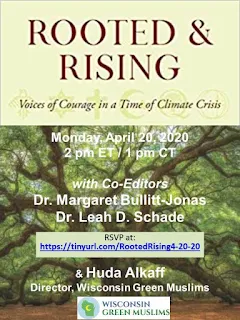ARE WE GOOD ANCESTORS?
I think a definition of "ancestors" might be in place here. If we were to take a Native American definition, I think we would have to consider several things: care for creation, resting lightly on the land, forming bonds of community that last, passing on the lessons of the Elders to the young ones, generosity to those with less, worshipping the Creator Spirit, and living in harmony with nature.
My ancestors were white, privileged, and some, people of wealth. (My great-grandfather Seelye.)
What got passed down to me were these things: the importance of education, both for men and women; a love of books and reading; working for social justice; generosity; care for the poor; love of family; and love for nature, especially birds.
But now we find ourselves in a dire situation where people who know nature and this planet are warning we are almost at a place of de-stabilizing our planet. m(David Attenborough)
This causes my heart to flutter and my stomach to clench. I hate it that the world we are passing on to our children and future generations is in such danger. We have not been good ancestors. It is plain as day.
We have consumed the earth, as if it were something on display in Target, scooping up items, sticking them in our basket, and waltzing back to our car humming an old tune. We have polluted the earth, our rivers, and our oceans so that the Great Barrier Reef should be declared endangered and protected (come on, Australia!~ Unhook from the coal industry.). Brazil, under Bolsonaro's evil regime, is decimating the Amazon--"the lungs of the earth" as Pope Francis calls it--as well as the Indigenous tribes. Our desire for money and profit is killing us.
You know all this. So what can we do? How can we become better ancestors to the ones who come after us? I have a few thoughts.
--tell our stories. Get our kids, grandchildren, kids at church and in the community involved in our narratives. Tell about what it was like growing up. For me, that is in the late 40s, 50s, and 60s. Remember all the insects on our car windshields? Remember the bright fall of fireflies in the summer, so much that we captured a few in a jar to light our bedrooms and let them out in the morning?
Remember the massive snowfalls that we made snow forts in? Let them know the world was not always like this.
--show them pictures of what the world used to be like that we grew up in: the maple syrup buckets on the trees, sledding tracks in deep snow, the rains that came but did not, mostly, destroy the earth. Show them the crystal-clear photos of the rivers and the oceans. (Yes, I know, that time also included rivers which were polluted and caught on fire. But we have made some progress.)
--read Genesis to them and explain that "dominate" does not mean, "dominate." That it means to be friends of God, people who care for creation and make sure it is fruitful. We need to become friends of creation, as God intended.
--talk to the next generation about slavery and what racism has done to the BIPOC community, as well as Indigenous communities whose land was stolen from them. Let them know that our desire for profit has had consequences going back to 1619.
Tell them the stories, and if young, show them the picture books.
One thing I find hopeful, amid all of the things I fret and worry about, are some of the changes folks are making coming out of the pandemic. Low-wage workers are leaving their jobs in droves, the biggest losses ever; some folks are so happy with remote-learning that going into the office only occasionally seems best to them; a few businesses and corporations (see the NY Times article in 6/23/21 on the shorter work week) are looking at the productivity and gains made for both workers and employers with a 4-day work week, using the same pay as for a 5-day work week. All of these things would mean less commuting, less pollution from cars. These are good things.
But if we are to pass on (as if it were "ours" to pass on!) a planet that is not endangered and can flourish for all life forms, not just humans, we are going to have to make serious changes, both individually and collectively. You know this.
Christians of all denominations need to see that contributing to the flourishing of the earth and her life forms is part of worshipping God, is part of Her plan. This should be preached in churches and on the streets, but I have no hope of this in either most Catholic or Evangelical Churches.
Check out Margaret Bullit-Jonas, an Episcopalian priest, who has made working against climate change the central issue of her ministry and life. Her book, including many others working against climate change, is, "Rooted and Rising."
Worth investigating. Read "Finding the Mother Tree" by Susanne Simard, whose innovative research has alerted scientists and the rest of us to the interconnections and communications between trees.
Check out "Braiding Sweetgrass: Indigenous Wisdom, Scientific Knowledge, and the Teaching of Plants" by Robin Wall Kimmerer.
We need to have a more expansive understanding of nature and our place in it. And if we cannot receive wisdom from our elders, who may no longer exist, then we can learn from Indigenous communities and writers, gaining tools to help us preserve this blessed, green/blue planet. Pray for Gaia each morning, pray that the tide of consumption and greed will be reversed enough so that our planet can be saved for generations to come.











Great blog, Annie. Right on!!
ReplyDelete